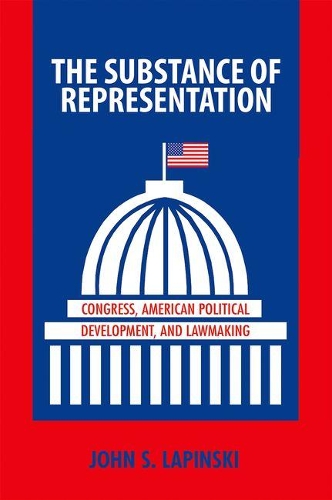
The Substance of Representation: Congress, American Political Development, and Lawmaking
(Hardback)
Available Formats
Publishing Details
The Substance of Representation: Congress, American Political Development, and Lawmaking
By (Author) John S. Lapinski
Princeton University Press
Princeton University Press
18th November 2013
United States
Classifications
Tertiary Education
Non Fiction
Central / national / federal government policies
328.73
Physical Properties
Hardback
192
Width 152mm, Height 235mm
425g
Description
Lawmaking is crucial to American democracy because it completely defines and regulates the public life of the nation. Yet despite its importance, political scientists spend very little time studying the direct impact that the politics surrounding a particular issue has on lawmaking. The Substance of Representation draws on a vast range of historical and empirical data to better understand how lawmaking works across different policy areas. Specifically, John Lapinski introduces a theoretically grounded method for parsing policy issues into categories, and he shows how policymaking varies in predictable ways based on the specific issue area being addressed. Lapinski examines the ways in which key factors that influence policymaking matter for certain types of policy issues, and he includes an exhaustive look at how elite political polarization shifts across these areas. He considers how Congress behaves according to the policy issue at hand, and how particular areas--such as war, sovereignty issues, and immigration reform--change legislative performance. Relying on records of all Congressional votes since Reconstruction and analyzing voting patterns across policy areas from the late nineteenth to late twentieth centuries, Lapinski provides a comprehensive historical perspective on lawmaking in order to shed light on current practices. Giving a clear picture of Congressional behavior in the policymaking process over time, The Substance of Representation provides insights into the critical role of American lawmaking.
Reviews
"Lapinski develops a new tool kit to measure and analyze an expansive set of legislation and lawmakers' policy preferences from 1877 to 2010. His key contribution to the study of the American national legislature is his coding approach and the data development, which develops a deeper understanding of lawmaking. Through these, Lapinski offers findings about polarization, elite leadership in Congress, and the influence and impact of members of Congress and their policy preferences across different areas. This work will certainly contribute to developing a new discussion within the legislative studies field and give future political scientists new possibilities of expanding the research in the area."--Choice "He offers an astutely crafted schema that seems to this observer to avoid the trap of time boundedness and enables the APD enterprise to more systematically track the evolution of policy."--Ross K. Baker, Congress & The Presidency
Author Bio
John S. Lapinski is associate professor of political science at the University of Pennsylvania and the deputy director of elections at NBC News. He is the coeditor of "The Macropolitics of Congress" (Princeton).
